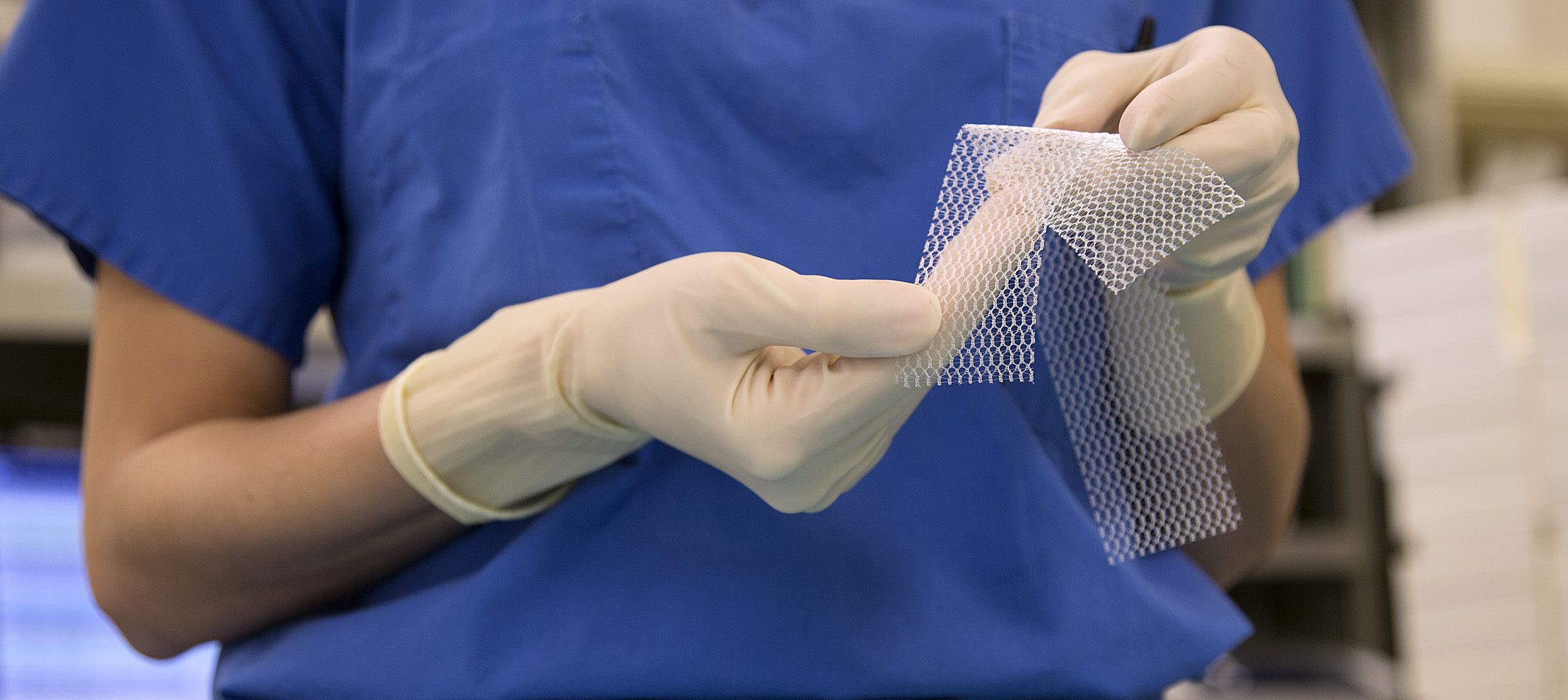 From the DukeHealth.org archives. Content may be out of date.
From the DukeHealth.org archives. Content may be out of date.
Is Vaginal Mesh Dangerous? Learn the Facts

Vaginal mesh can be a safe and effective treatment option when used for the right candidates.
Vaginal mesh surgeries have been the subject of serious concern because of complications associated with the use of vaginal mesh. However, misinformation has confused and alarmed women who have already undergone successful vaginal mesh surgery. Misconceptions have also led women away from appropriate treatment options for pelvic prolapse. Vaginal mesh can be a safe, effective option when used appropriately by experienced, skilled surgeons. As nationally recognized experts in the use of vaginal mesh, Duke urogynecologists want to ensure you understand the concerns, and have all the facts.
What is Vaginal Mesh?
While there are different types, the most common vaginal mesh is made from polypropylene, a flexible, woven plastic that can be cut into different sizes and shapes, depending on the procedure for which it is used. It is a permanent substance, so when it is used appropriately, it may add to the durability of the prolapse repair.
What Is Mesh Used For?
Mesh has been used successfully since the early 1990s to treat stress incontinence in the form of a synthetic sling, explained Dr. Amie Kawasaki, MD, a Duke urogynecologist. A strip of mesh, about the width of scotch tape, is implanted under the urethra, the tube through which urine leaves the body from the bladder. The sling acts as a sling or “hammock” under the urethra to reduce urine leakage when you cough or sneeze.
Wider, longer, pieces of mesh may be used to repair vaginal or pelvic organ prolapse, which occurs when the vagina and other pelvic organs drop from their normal positions. The mesh is implanted to hold organs in place either through small incisions in the abdomen, or through an incision in the vagina. The abdominal procedures using mesh to correct prolapse have been performed since the 1960s. Advances in minimally invasive surgery have made recovery from these procedures easier than from surgeries that historically were performed through large abdominal incisions.
Why Are There Concerns About the Use of Vaginal Mesh?
In 2011, the FDA noted that they had received numerous reports about complications associated with the use of vaginal mesh, including pain, bleeding, difficulty with intercourse, and mesh erosion or exposure, which occurs when the mesh material is exposed through the vaginal wall and into the vagina, explained Dr. Anthony Visco, MD, a Duke urogynecologist. The FDA communication urges doctors to be specially trained in mesh placement techniques, and to talk to their patients about the potential for complications associated with mesh.

If Complications Exist, Why Is Vaginal Mesh Still Used?
Vaginal mesh can be a safe and effective treatment option when used for the right candidates by experienced surgeons who are skilled in the appropriate surgical techniques. “Complications can occur with any surgery,” explained Dr. Visco, but those complications can be minimized when surgeons select appropriate candidates for the procedure and when doctors are skilled in the proper surgical techniques and experienced with vaginal mesh procedures. In addition, surgeons who utilize mesh should have had training on how to manage mesh complications.
How Do I Know if Vaginal Mesh Is Right for Me?
Your doctor should have a thorough discussion with you about your medical history and other factors to determine whether you are a good candidate for a vaginal mesh procedure. That discussion should also include a thorough understanding of the risks associated with the use of vaginal mesh, and his or her ability to recognize and manage complications should they arise. Several studies have described risk factors for mesh complications, such as obesity, poorly controlled diabetes, and smoking. Tobacco users may have a 4 times higher risk of mesh erosions.
The American Urogynecologic Society has patient fact sheets with questions women should ask their doctors when deciding if vaginal mesh is right for them. “These questions are a routine part of the conversations we have with our patients, and help in our decision-making process about whether vaginal mesh is right for them,” said Kawasaki.
What Should I Do if I’ve Already Had a Vaginal Mesh Procedure?
If you are not experiencing any difficulties, then there is nothing you should do. Vaginal mesh has not been recalled. The only people who should be concerned following a vaginal mesh procedure are women who experience vaginal discharge, pain with intercourse, or unexplained vaginal bleeding. If you experience any of these symptoms, make an appointment to see your doctor.
“Duke is a major referral center and has extensive experience treating women who need corrective surgery due to complications with vaginal mesh,” said Dr. Alison Weidner, MD, a Duke urogynecologist. “We are also actively involved in national research studies evaluating both mesh and non-mesh surgeries. The good news, is that there are many minimally invasive options for patients suffering with pelvic floor disorders.




